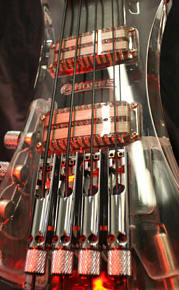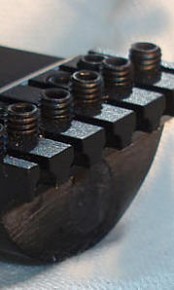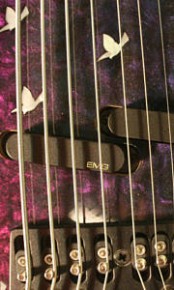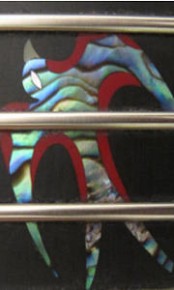



Sound Composites 'Strings' Parts

Technical Info
All Of The Support
Information That
You Need

Sonusphere Live Performance Loudspeakers ... Play Outside The Box to get the absolutely most realistic sound!

Company History Moses Innovation Over The Decades

Contact/Ordering
Contact Us, We are Here To Serve You
Phone: (001) 541-484-6068
Email: orders@mosesgraphite.com
The Phenolic used for fingerboards is dense, stiff and cheap. However…
Most Phenolic fingerboards are not impervious to temperature & moisture.
Phenolic fingerboards wear out.
Phenolic is used by manufacturers because:
They have not developed a better material.
They can buy it in the correct slab dimensions.
It is not expensive.
They may believe that it ‘lessens’ string wear.
It looks acceptable when new.
The proprietary Sound Composites fingerboards provided on all standard neck models are:
Impervious to string wear.
Satin smooth to the touch
Absolutely impervious to moisture.
Tonally consistent and even throughout the entire fingerboard surface.
This has allowed Sound Composites to produce a material designed for optimal
technical and sonic outcomes, not just for ease in making a neck.
Phenolic sheet is a hard, dense material made by applying heat and
pressure to layers of paper or glass cloth impregnated with synthetic
phenolic resin. These layers of laminations are usually of cellulose
paper, cotton (linen) fabrics, synthetic yarn fabrics, fiberglass fabrics,
canvas and unwoven fabrics. When heat and pressure are applied to the
layers, a chemical reaction (polymerization) transforms the layers into a
high-pressure thermosetting industrial laminated plastic.
All grades of phenolic ( as well as wood) are, to varying degrees,
hydroscopic and not resistant to moisture. The material absorbs moisture
through the exposed ends of the layers of cloth. This is why you see
lighter colored (whiter) lines running in the direction of the strings as
phenolic fingerboards get older. Thus they are not impervious to humidity.
One manufacturer states that they attempt to ‘renew’ boards by applying
WD-40 lubricant. This is because WD-40 displaces moisture on the surface
of parts. However, it does not displace moisture that has ‘wicked’into
and remains trapped in the interior of the fingerboard. Regardless, do
you really want an ‘oily’ WD-40 liquid on your fingerboard?
Sound Composites fingerboards do not have any paper or cotton materials
that do this. The boards are composed entirely of moisture-proof epoxies and
carbon-based materials.
Phenolic is not stable. It warps when heat is applied to one side of the
fingerboard. And when the fingerboard cools down, it stays warped; it has no
memory. Shine a 60 watt light bulb on one side of a phenolic fingerboard for
a while and see what happens if you dare. Phenolic fingerboards (along with
wood) are not impervious to temperature.
Imagine the internal stresses (battle) going on in a carbon graphite or
wood neck, when the neck beam is staying stable or moving at one rate, and
a phenolic or wood fingerboard is trying to pull in another. Why bother
having a neck with this happening?
Sound Composites fingerboards for classical stringed instruments are
designed to have the overall textbook density of Ebony. Thus, they are
entirely compatible with wood-necked classical instruments. Sound Composites
fingerboards are designed to be impervious to wear, and for sonic and tonal reasons
only. Stiffness is provided elsewhere in the necks. Thus we have the freedom to
do precisely what is right for the sound and longevity of the neck.
Phenolic and some woods are dense but wear out. Strings and fingernails
dig grooves in these fingerboards. Then the boards need to be re-leveled
or replaced. They are not impervious to wear.
Sound Composites fingerboards are not reliant on density to deliver a
‘non-wearing’ surface, even when using roundwound strings on fretless
basses over decades of performance. Sound Composites does not have
to compromise due to the perceived hardness and density needs of other manufacturers.